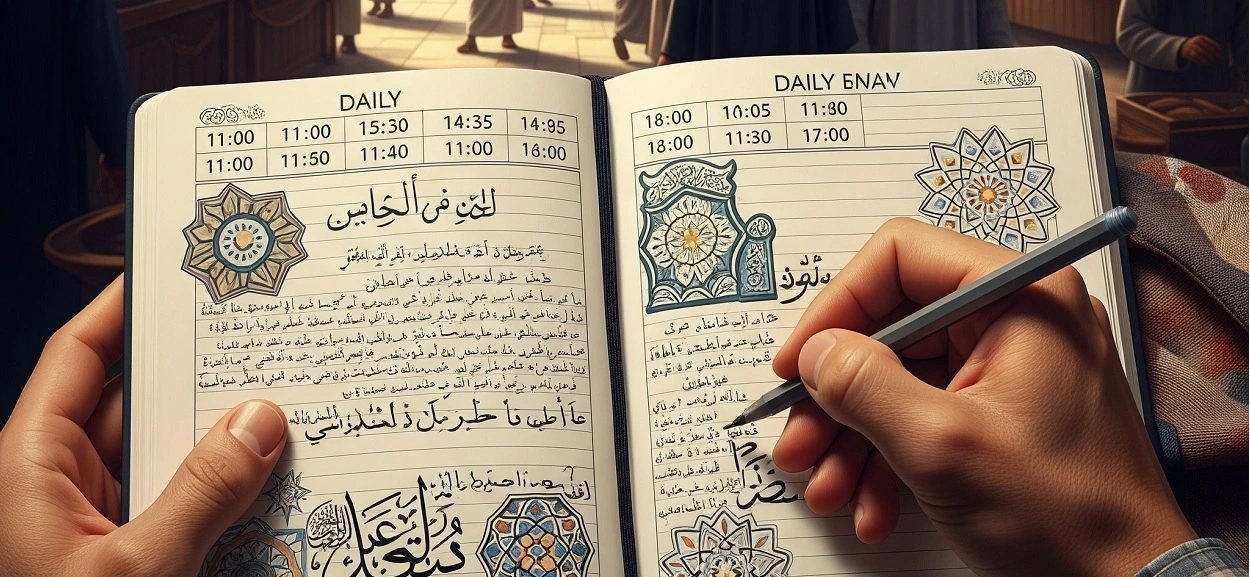Islamic Time Management: The Secret to a Blessed and Productive Life in This World & The Hereafter
Feeling overwhelmed by time? Discover the secrets of Islamic time management for a calmer, more productive, and blessed life. Turn every second into an act of worship.

Have you ever felt like 24 hours a day isn’t enough? A pile of tasks awaits, family demands attention, and religious obligations feel heavy amidst a packed schedule. In this fast-paced era, we all face significant challenges in managing our time, often ending up feeling tired, stressed, and even regretful.
But what if there’s a “secret” taught centuries ago that can transform your life to be more blessed, peaceful, and productive, not just in this world but also in preparation for the hereafter? That secret lies in Islamic Time Management. It’s not just a technique for organizing schedules; it’s a philosophy of life rooted in the belief that time is a trust from Allah SWT. Let’s delve into how we can unlock the potential of our time.
Time: The Greatest Trust from the Creator
In Islam, time is not an ordinary commodity to be bought, sold, or wasted. Time is a great blessing, the capital of life, and a bridge to eternal happiness. Allah SWT often swears by time in the Quran, affirming its nobility:
“By the declining day. Indeed, mankind is in [grave] loss. Except for those who have believed and done righteous deeds and advised each other to [hold to] truth and advised each other to [have] patience.” (QS. Al-Asr: 1-3)
This verse is a stern warning: every passing second not filled with faith and righteous deeds is a great loss. We will all be held accountable for every minute given. Prophet Muhammad (PBUH) said, “The feet of a servant will not move on the Day of Judgment until he is asked about four things: his life – how he spent it, his youth – how he used it…” (HR. Tirmidhi). This is the fundamental basis for why Islamic Time Management is so vital.
5 Islamic Time Management Strategies for a Blessed and Productive Life
How do we apply this profound concept to our busy daily lives? Here are practical strategies inspired by Islamic teachings and our best role model:
1. Starting the Day with Fajr’s Blessing: The Foundation of Muslim Productivity
Strategy: Wake up before dawn, perform the Fajr prayer on time, and utilize the time between Fajr and shuruq (sunrise) for dhikr (remembrance of Allah), reading the Quran, and planning your day.
- Islamic Foundation: Prophet Muhammad (PBUH) supplicated, “O Allah, bless my Ummah in their early mornings.” (HR. Abu Dawud). The morning hours, especially after Fajr, are filled with blessings and positive energy.
- Benefits: Starting the day with worship soothes the soul, clears the mind, and provides spiritual focus. Worldly, it gives you “quiet time” before the busyness begins, allowing you to plan your day calmly and complete important tasks without interruption. This is the foundation of Muslim productivity.
2. Prayers as ‘Time Markers’ and Productive Breaks
Strategy: Make each obligatory prayer time a reminder to pause your activities, reflect briefly, and take a break. Use these breaks to evaluate what has been achieved and what needs to be done next.
- Islamic Foundation: Prayer is a pillar of faith and an obligation whose times are fixed. ”…Indeed, prayer has been decreed upon the believers a decree of specified times.” (QS. An-Nisa’: 103).
- Benefits: Prayer provides structure and discipline to your day. It’s not a hindrance to productivity but a remarkable time management tool. Prayer breaks help refresh the mind, prevent fatigue, and redirect focus back to your goals. This brings inner peace as you fulfill Allah’s right.
3. ‘Task Batching’ Like the Companions: Focus on One Thing at a Time
Strategy: Group similar tasks together and work on them in a single block of time. Avoid multitasking, which is often inefficient. Give your full attention to one task until it’s complete before moving to the next.
- Islamic Foundation: The companions were known for their diligence and focus in worship or completing tasks. When they learned from the Prophet, they were fully focused. When they engaged in jihad, they focused on the battlefield. Imam Shafi’i even said, “If you do not busy yourself with good, then [time] will busy you with falsehood.” This implies focusing on what is right.
- Benefits: Increases efficiency and quality of work. With full focus, you reduce errors and complete tasks faster. It also reduces stress because you don’t feel overwhelmed by many things at once.
4. Optimizing Downtime with Dhikr and Knowledge
Strategy: Utilize “dead time” or unused free moments (such as waiting, commuting, or in line) for dhikr, listening to religious lectures, reading the Quran, or reading Islamic books.
- Islamic Foundation: Prophet Muhammad (PBUH) said, “Two blessings which many people waste: health and free time.” (HR. Bukhari). This Hadith encourages us to use our free time for beneficial things.
- Benefits: Every second becomes valuable worship. You’re not just filling time, but also increasing spiritual closeness, gaining knowledge, and earning rewards. This is a perfect example of Islamic life balance that integrates worldly and otherworldly aspects.
5. Avoiding ‘Taswif’ (Procrastination): Fight Delay with Strong Intention
Strategy: Recognize and combat the habit of procrastinating. Start tasks immediately, even if they seem difficult or unpleasant.
- Islamic Foundation: Islam encourages us to hasten towards good. Allah SWT says, “And hasten to forgiveness from your Lord and a Garden as wide as the heavens and earth, prepared for the righteous.” (QS. Ali Imran: 133). This verse emphasizes the importance of speed in doing good.
- Benefits: Reduces mental burden and anxiety. By completing tasks earlier, you have more time for other things, including worship or quality rest. This is a crucial key in effective Islamic daily planning.
6. Quality Rest (Qailulah & Sufficient Sleep): Part of Productivity
Strategy: Do not neglect rest. Include a short nap (qailulah) if possible, and ensure your night sleep is sufficient and of good quality.
- Islamic Foundation: Prophet Muhammad (PBUH) recommended qailulah (a short nap). He also slept in the second third of the night and woke up in the last third for worship. Sleep is a right of the body. ”…Indeed, your body has a right over you…” (HR. Bukhari).
- Benefits: Sufficient rest improves concentration, memory, mood, and overall physical health. A refreshed body will be more productive in both worship and worldly activities.
Life Transformation: More Than Just Efficiency
Implementing Islamic Time Management is not just about how you can complete more tasks. It’s about how you can live with full awareness of your life’s purpose, filling every second with meaning, and achieving true blessings of time.
You will find yourself calmer, more connected to Allah, and possessing greater energy to face challenges. Life will feel more directed, no longer like a rudderless boat in an ocean of busyness. You will not only become more productive in this world but also actively build the best provisions for eternal life in the hereafter.
Start Today, Achieve Blessings!
Don’t wait any longer. Choose one or two Islamic Time Management strategies that appeal most to you and start implementing them today. Feel the difference in your life.
What has your experience been like in managing time as a Muslim? Are there other tips you’d like to share? We’d love to hear your stories in the comments section below!
For more Islamic tips on productivity, spirituality, and blessed living, don’t forget to subscribe to our newsletter and explore fascinating articles in the “Islamic Lifestyle” category on our website. May Allah bless every step we take!





Comments